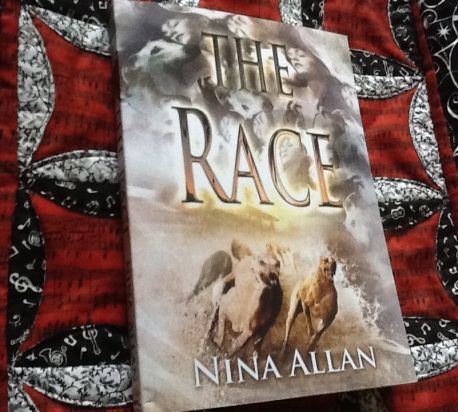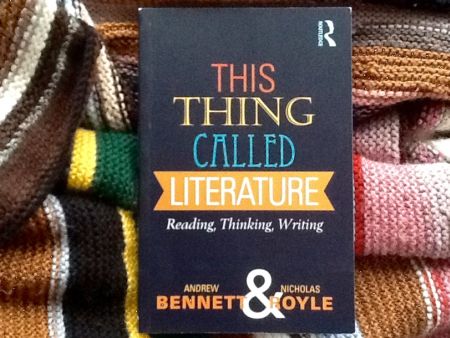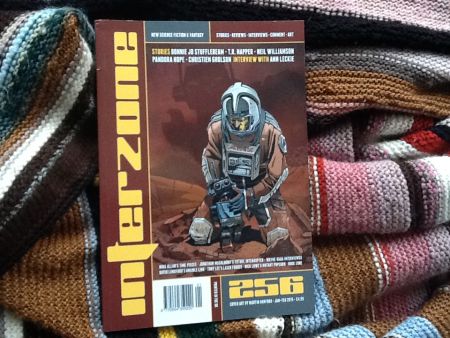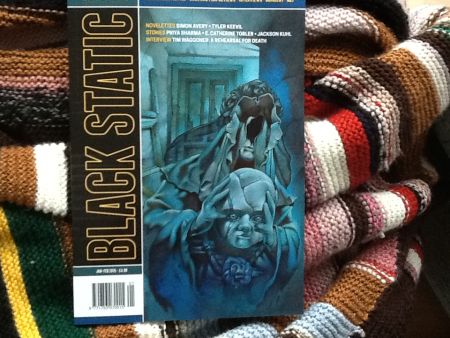The Race – Nina Allan

THE RACE by Nina Allan
NewCon Press 2014
I received this book today as purchased from Amazon UK and I intend to real-time review it in the comment stream below as and when I happen to read it…
Filed under Uncategorized
www.nemonymous.com
Des Lewis - GESTALT REAL-TIME BOOK REVIEWS
A FEARLESS FAITH IN FICTION — THE PASSION OF THE READING MOMENT CRYSTALLISED — Empirical literary critiques from 2008 as based on purchased books.




 The Ferry Man by Pandora Hope
The Ferry Man by Pandora Hope
Page 7 – 19“Del and I lived mostly out of tins, canned ravioli and baked beans and those nasty little frankfurter sausages swimming in brine. They always stank of fish, those sausages.”
That pungent item of diet notwithstanding, I am artfully plunged straight into a believable ambiance of what at first appears to be a cross between sausages and fish – no, a cross between an SF alternate world and a real inalternate dystopic future history blooming ingloriously from a coastal area Kentway, I gather, but not a million miles from where I live on the North East Essex coast, with its creeks and shanty towns, full of London accents and dogfights, but now, in this book’s scenario, a place and people frackingly and genetically engineered. Told from the point of view of an already well-characterised girl about her brother Del and her gritty background, and how he starts getting ambitions about the ‘smartdog’ races, on which I am already gradually getting a handle, a third cross, a cross between dog and human runner? Spliced or remaining separate? I am still unsure. I shall try not to reveal too much anyway, for fear of spoilers. All this written in Allan’s trademark smooth but textured style, each word redolent with accretion.
“Then sometimes when she heard a new word, she’d grab towards the mouth of the person who had spoken it – as if she saw words as solid objects:”
We learn of the beginnings of youthful sex – including the most striking description of a ‘dick’ I’ve ever read! – and, amid this growing up of the various characters, the accrual of our understanding of the remarkable ‘smartdogs’, and the special nature of a baby’s growth of understanding and talk, especially a special child like this narrator’s niece Lumey appears to be; the most remarkable phenomenon in natural history, human babies, I guess, and all of them living under the sun that we all know in or out of this book, a sun that one day will explode and likely make us toast, as some of those in the plot would have us believe. The plot races along quickly and compellingly, yet lastingly. ‘Run’, it says, and the author needs to have traction against running too fast, as she skilfully does. So far, this book has a Paul Meloy vein to it, merely that, just a comparative tinge of place and feel between two authors, both ‘runners’. I mean that as a compliment to the authors concerned. I will now try to take in longer breaths of text and hold each one in my reading lungs, before I race off with another bit of this review. And to continue giving what effect it has on me, rather than a spoiler-prone itemisation of its plot as I go along. See you later.
My previous reviews of works by Nina Allan HERE.
“…and that coincidences even of this size were happening to people all over the world, right now:” – The Bone Clocks: page 21
“…and at some point I realised the fiction had taken me over,…”
Jenna’s junk, collection of. Magpies. Her brother Del’s dubious and often drug-dealing machinations impelling business aggrieved parties’ abduction of his daughter Lumey. A definite feel for this society’s ‘criminal’ ambiance, amid the evocative marshland of barge sledders etc. “It was as if my life had split into two separate halves: one mad, one sane.” Further realisation of the nature of the smartdogs and their runners, hand in glove, literally and metaphorically. There is a sense of race as racial as well as in racing dogs. Jenna’s meticulous, almost sensual, handiwork manufacture of gloves or gants or gauntlets or guards for smartdog business usage. Each fingerstall of the glove a condom for that symbolic ‘dick’? No, but there is something going on here, that I have not yet fully fathomed. Nor shall I later try to fathom it for you. That would prevent you from doing it for yourself. A pre-emptive spoiler. Spoiler-guards.
“It might seem like a waste, to spend so much time and effort on a glove’s lining when mostly only the wearer would know it was there.”
…as if this book itself is a bespoke one, where each reader will be given their own lining, their own special ‘objects correlative’ to gather between or beneath the textual lining. Certainly I sense much obsessive interest in Jenna’s making of gloves or gants, with almost a bi-sexual gloss to their making and fabric of outcome. Also, the synergy (leading, racially, to a “a new race, almost” for a new synergy) between runner and dog seems like the growing relationship between author and narrator, or even between author or narrator and reader. And this ‘narrative according to Jenna’ has now ostensibly ended, and I think I know her well, know her (Jennafer) through the tipping-point of events regarding her brother Del (Derrick) and his wife Claudia, through the spectacular and eventually shocking dramatics of the smartdog heats, quarter finals etc, through where life and death actually hangs on one of those races competed by the sleek dog known as Lim or Limlasker, through the striking description of the shale gas detritus of a land, through her later evocative journey toward the South London no-man’s-land where I once lived for 22 years in the 70s and 80s, alternate world or not. And going for a coffee “at Goldfrapps, on the Bulvard,…”
Pages 91 – 114
“…and staring at the books in the bookcase as if the words on their spines contained a coded message.”
Croydon is mentioned again, a place in which area I spent 22 years of my life. And Hastings, where I spent several happy summer holidays staying with my grandmother in the 1960s. I know the place well. And now it seeps out at me from this book, its West and East Hills, Old and New Town. Including an astonishing specific mention in this text of St Mary’s Terrace where my grandmother actually lived when I stayed with her! And I absorb the connections, too, between, this Christy narrative and the Jenna one, such as the Delawarr Pavilion that I know happens to be in the Bexhill that is mentioned in this Christy section and the earlier ‘Delawarr’ smartdog race trophy… This is indeed a fascinating experience, an alternate to an alternate (but which is more real?), a filter working both ways, connections striving to reach connections via word or reflection. This section is about Christy and her brother Derek. And there is also a woman who wore gloves winter and summer just like my grandmother used to do. And later there is a shocking scene where you might need to wear prophylactic gloves as you turn the pages describing it…. Also, Doris Lessing, the Bakelite wireless, the ancient camcorder… “He handled objects carefully and with precision,…”
Christy’s life in Hastings is beautifully told by herself till she leaves for London, a text hasting yet meandering, lessening the more and vice versa. That shocking event in her recent past that seems to permeate and separate. The close people who leave and lessen her life suddenly, leasehold as well as freehold, the palimpsest of two Hastings, one real and one slightly unreal, one more one less, one Old one New, one East one West. My thoughts, not necessarily the book’s. I think this book may be a special form of palimpsest I’ve not encountered before?
“A strange little shiver went through me as I wondered if she was dumb, a real life version of Hans Andersen’s Little Mermaid,…”
Judging by the high quality of writing — in this meaningfully poignant section of text which is Christy’s now completed narrative (starting near Peckham and ending near Peckham with some new contacts of different racial colour and visits back to Hastings in between) — I can quite believe that she is what she tells us she is: a budding writer of fiction, indeed an accomplished one as she proves to be by the end of this sophisticated section of almost Chick Lit (relationships, friendships, romantic twists and turns, plus her brother Derek and her father, both sick in their different ways), sometimes with speculation upon a slightly off-key Alternate Reality perceived around her, or a possibly stronger Alternate Reality about which her narrative tells of herself creatively writing as part of the ambition to be a writer. Absolutely absorbing.
“Instead of reaching out to one another we had dived inward, into worlds that lay in close orbit but never touched.”
— from ‘The Bone Clocks': Page 67
Pages 149 – 176
The next narrative section (completed in one sitting) has no ostensible narrator, as if it’s your duty as the reader to take up the running. Reader and author as a miscegenate partnership, in racial synergy, subject like Tash to what happened to Limlasker. This narration is a sort of catharsis of truth, sorting the heretofore reality wheat from the fiction chaff… absolving guilts by the balance of probabilities, picking books off the shelf that characters within them actually wrote for themselves like lexic gloves, I guess, all mixed with knowledge of the racial bloods running through the veins of some of those characters, the African connections, the pre-Ebola Freetown of the spirit. Prejudice and roots. The mix of authors, Samuel Delany and John Cheever… The return to the battle in Hastings via a future when people started using snail mail again because of the unreliability of the Internet. The miscegenations or mis-connections coming home to roost, even if some become successful hybrids, genuine connections, when or if each page fully loads. A clever still evolving multi-palimpsest…
Pages 177 – 201
“Words written down on paper stay alive.”
It is almost a relief to be back in the hands of a direct first person narrator. Now, it is Maree whom tellingly is linked to her earlier name Luz from the ‘smartdog’ reality that re-emerges with research connections in an ongoing conspiracy, a topical way to defeat a growing beachhead of enemies, fighting terrorism with terrorism…? Just inferences.
Here, upon a redolent voyage toward such work, Maree (disowning her parentage, like Holly’s beginning ‘voyage’ in ‘The Bone Clocks’) conveys to me a uniquely more Sapphic world where the Warriors-of-Love ‘By the Goddess!’ expletive may one day become paramount again. There is also a woman steeped in the essence of sea, who may reflect that earlier mermaid, a Chief Steward on board named Djibril, a paucity of electricity, paper words unfracking the electronic…
Meanwhile, we continue provokingly to harvest reality and truth from all manner of overlapping fictions.
All read by my mind here inside its own Dream of Essex, a Dream from or upon the coastal edge of Essex where I am islanded enough to read this promontory of a book, a book of various worlds, alternate or not, parallel or not, still continuing — “Most of what I know about the world comes from books.”
“The faded women in the drawings all wore bright smiles, yet still they seemed sad.”
Thankfully, there are no easy correlations from this end narration, no set-book theories for a snobbish literary critic to forge, no formulae or templates for connecting with the past, the future, the present or the adjacent. The Pynchon release of the trapped young girl hare for us to chase into womanhood. You as reader need to work at the text and equally be worked by the same text, a ‘smartdog’, someone to be sacrificed to the dynamited words, words that mean more than just words, as you delve deeper into Maree’s journey, with its barely graspable conceits of place and time, the whales seeming like Todash gateways or an archipelago of small islands, the retrocausally puckish steampunk, the indecorous dicks or cocks, the chick lit relationships, the warriors now squaring up from St Leonards: those faded women: those same would-be warriors who once made cheap dresses rather than sleek gloves, we readers with our own race still to run or become.
“Or that memories you carry are false, that you’ve been in a coma since you were ten.”
Can you tell that I have been truly inspired by a personal journey I have experienced with this remarkable novel? And that is despite what I consider to be a little too much explication or denouement imparted by one party to another at the end, but then I realised that explication is only one party’s view among many other feasible such attempted ‘triangulations’ through the real-time reviewing by characters, narrators, author and readers in an ever shuttling palimpsest of fictions.
The actual crucial dramatic attack of the voyage’s craft by a gravitationally impossible baer-whale is a great read, but the nature or outcome of this would be a spoiler to divulge. For me, this phenomenon was either the reincarnation of my grandmother come to punish her beloved grandson for the life she’s watched me live or it is something potentially impending in my personal life that makes this passage seem significant: “And doctors can be wrong, everyone knows that. I told him he should carry on with his life as usual…” A timely affirmation. As is Maree’s own affirmation in the very last sentence of this wonderful book.
end